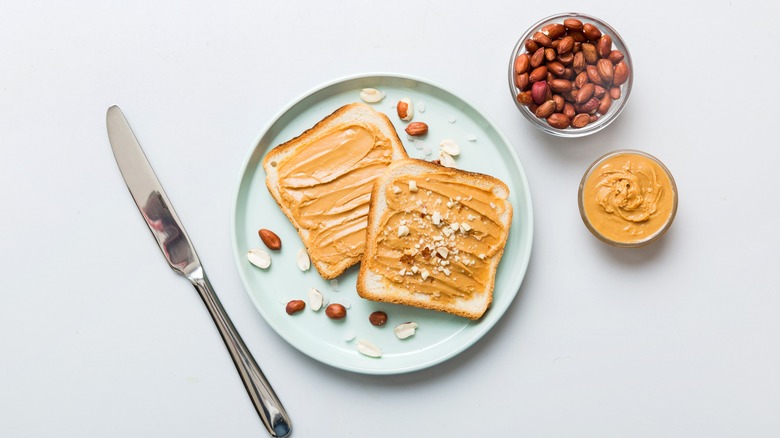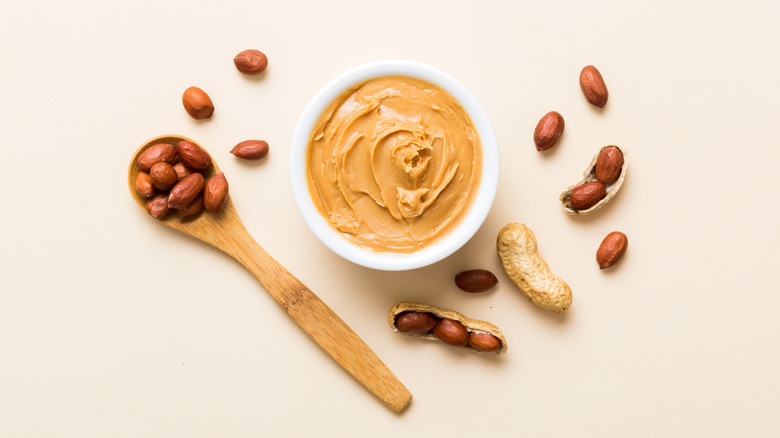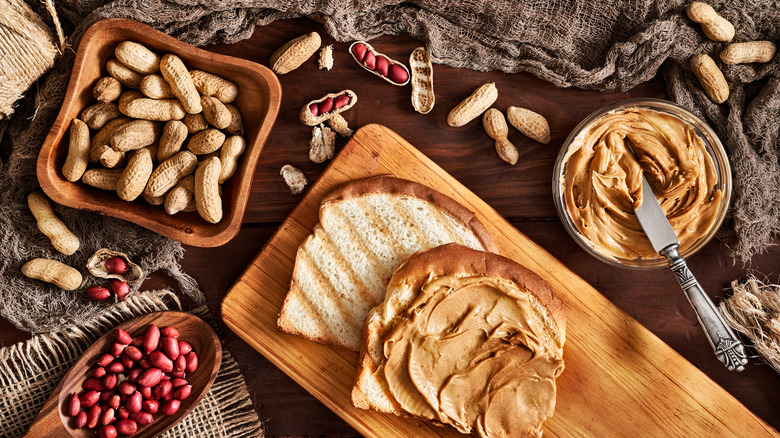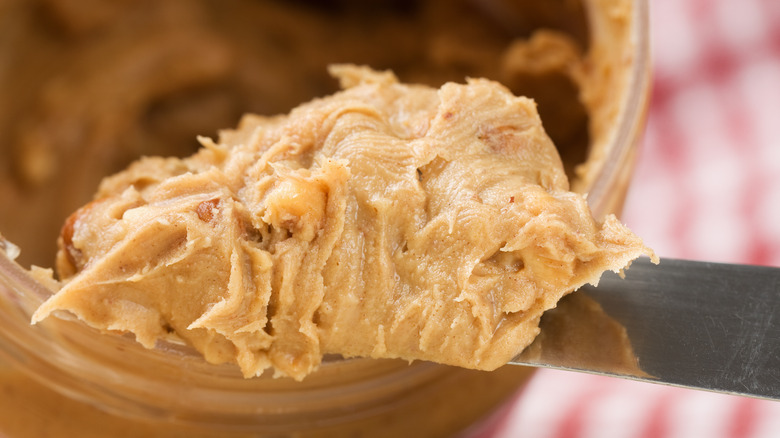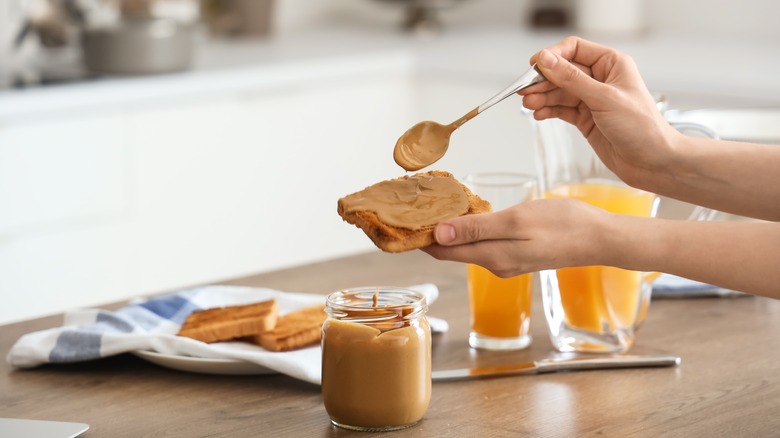Should You Eat Peanut Butter Every Day? This Is What Happens If You Do
Peanut butter is one of those classic pantry staples that seems to make its way into many an easy sandwich or nostalgic childhood snack. Got half an hour and some flour and sugar? Bake some peanut butter cookies. Struggling with what to do with the last banana? Cut it into slices with some peanut butter in between. Only have a minute to throw together lunch? Make a PB&J (and add in this spicy ingredient). It's so easy, so delicious, and so satisfying.
But for anyone with a prevalent craving for the nutty goo, it's worth asking whether or not too much of a good thing can become a bad thing. While sugar intake is often a big concern depending on your peanut butter brand of choice as well as other additives to be mindful of, such as palm oil, what are some other things to think about when reaching for this tasty, spreadable treat? Peanuts and peanut oils do indeed come with health benefits that might encourage you to seriously consider making peanut butter a more regular component of your everyday diet.
It can help lower the risk of diabetes
This might sound like an odd one, considering how much added sugar can be found in a number of major peanut butter brands, but the continued and consistent consumption of peanut butter can lead to a lower risk of diabetes. The American Heart Association states, "People who regularly eat nuts or nut butters have a lower risk of heart disease or Type 2 diabetes than those who do not include them in their diet."
While it's important to be careful of the sugar levels in peanut butter that may counteract this particular benefit, healthy fats and other nutrients such as protein and fiber offer a bit of balance. Be sure to take a good look at the nutrition labels before committing to a type of peanut butter. More than 5 grams of added sugar or more than 100 milligrams of sodium per serving won't be as nutritous for you. It's also helpful to mix it up with a few other types of nut butters from time to time, too.
Peanut butter could help with maintaining a healthy weight
With all of the nutrients in peanut butter, protein and fiber are perhaps two of the most important. A standard serving of peanut butter provides about 7 grams of protein and 2 grams of dietary fiber, both of which are great for helping maintain a healthy weight. A 2022 study from the National Institutes of Health (NIH) found that "higher protein and fiber diets promote weight management and metabolic health." This means that peanut butter can be a simple and super effective way to help bump up your daily intake of protein and fiber, which can aid in any weight goals, whatever they may be.
Additionally, because peanut butter is calorie-dense, it can also help you feel fuller for longer which can help curb cravings and prevent over-eating, too. Cut up a few apple slices with 2 tablespoons of low-sugar peanut butter for a nutrient-rich snack when that mid-day slump hits to help you get through the afternoon before dinner.
Aids digestion
Fiber isn't the only thing in peanut butter that will help keep your digestive function regular. Niacin (otherwise known as vitamin B3) is also a helpful nutrient for the digestive system as well as the nervous system, and the naturally occurring monounsaturated and polyunsaturated fats in peanut butter can help to slow down your digestion, which in turn, prevent muscular breakdown.
Peanut butter is also high in magnesium with about 50 grams of magnesium in a 2 tablespoon serving of peanut butter. Getting enough magnesium is crucial to help with gut mobility, or the process of transporting food and nutrients through the digestive system, and an added dose of magnesium every day by way of an extra serving of peanut butter can make for a happier and healthier gut. While there are all kinds of magnesium pills and powders on the market, peanut butter is an easier way to get it from the food you already eat.
Offers necessary fiber and daily fats
Fiber isn't just for helping maintain a healthy weight and keeping your digestive system in good working order. An appropriate consumption of daily fiber is also great for keeping cholesterol and blood sugar levels low and ensuring regular bowel movements, even helping to avoid painful ailments like hemorrhoids and constipation. Women, on average, should plan to eat 21 to 25 grams of fiber per day, while men should get 30 to 38 grams per day.
On top of good fiber, the healthy fats in peanut butter, oleic acid in particular, are great for maintaining healthy blood pressure and thereby lowering the risk of heart disease. Omega-6 fatty acid and an amino acid called arginine can also be found in peanut butter, and both of these are particularly good for helping blood vessels function properly. Between the fiber and fat content alone, peanut butter makes a great daily snack, but there is even more it can do.
Help manages cholesterol
While fiber is definitely a big cholesterol management factor, there are other components in peanut butter that help maintain healthy cholesterol levels, too. You may worry that the fats in peanut butter would affect cholesterol negatively, but in fact, the opposite can be true based on what type of fats are in your peanut butter.
The two types of cholesterol are known as HDL (high-density lipoprotein) and LDL (low-density lipoprotein). HDL is known as the "good" cholesterol which can help clear extra cholesterol from your body by delivering it to the liver, while LDL is known as "bad" cholesterol that can build up and risk clogging your arteries. The naturally occurring monounsaturated and polyunsaturated fats in peanut butter are healthier for you than saturated fats which raise LDL levels. By keeping these low with monounsaturated and polyunsaturated fats, managing cholesterol levels becomes a lot easier. The unsaturated fatty acids and the lack of trans fat in peanut butter only add to its benefits when trying to manage cholesterol.
Delivers antioxidants and can help fight inflammation
Antioxidants can feel like a buzzword, but really, they help fight free radicals, which are essentially unstable molecules that can throw off the body's functionality – even causing big problems like heart disease and cancer. Antioxidants, on the other hand, help to neutralize free radicals and help prevent such damage from happening. Peanut butter is full of both p-coumarin and resveratrol, two types of antioxidants that are associated with a variety of health benefits, including lowering the risk of chronic diseases.
As for the anti-inflammatory properties in peanut butter, the healthy fats, the antioxidants mentioned above, the dietary fiber, the amino acid arginine, and the magnesium, as well as an omega-6 fatty acid known as linoleic acid, are also helpful in reducing inflammation in the body. This can, in turn, help prevent both acute and chronic pain and discomfort, even in some cases, diseases and tissue damage.
May help prevent some types of cancer
The anti-inflammatory benefits of peanut butter can go even further than just preventing chronic pain. Breast cancer, the second most common type of cancer in women in the United States, can be prevented by avoiding Benign Breast Disease or BBD, which is directly linked to heightening the risk of breast cancer. One of the best ways to prevent BBD is the regular, daily consumption of both vegetable protein and vegetable fats, especially when incorporated into the diet early in life, according to a study in the National Institutes of Health.
Peanuts, luckily, are rich in both. As a legume, peanuts are easy to add to a plant-based diet, and as they are full of both protein and healthy fats, they certainly fit the bill. An additional daily serving of peanut butter, particularly for young women, can do some serious heavy lifting when preventing the risk of breast cancer.
Assists with heart, eye, and brain health
Hearts and eyes and brains, oh my! All of these are important things to bear in mind when considering your overall health, and peanut butter is packed with nutrients that can keep all three healthy and functioning properly.
Regarding heart health, those unsaturated fatty acids mentioned earlier pull their weight to help lower cholesterol and prevent heart disease. The vitamin E content in peanut butter is particularly good for helping curtail what's known as age-related macular degeneration, which is the deterioration of a crucial part of the eye, especially in people over the age of 60. And, finally, in terms of brain health, vitamin E also aids cognition and brain plasticity, or neuroplasticity, which helps your brain adapt and change gears based on new information you receive. In addition to all of this, the brain needs a constant supply of nutrient-rich fuel, and peanut butter is a great starting point. With benefits like these, why wouldn't you eat more peanut butter?
Strengthens bones
Bone health is a major factor when examining overall wellness, and peanut butter could have a big positive effect on helping build strong bones. Protein-rich foods are great for bone health both in young people and older folks. Not only does protein help bone grow in the early years of human development, but it also aids in keeping bones strong as the years go by and you begin to age.
Peanut butter's protein content can vary from brand to brand, but generally speaking, the average peanut butter will have about 8 grams of protein per 2-tablespoon serving with some types going as high as 14 grams per serving. That's a hefty dose of extra protein that's super simple to incorporate into an everyday diet for the sake of healthy bones.
The Mayo Clinic recommends, "anywhere from 10% to 35% of your calories should come from protein. So if your needs are 2,000 calories, that's 200 to 700 calories from protein or 50 to 175 grams." Just a single serving of peanut butter makes an immediate dent in that daily goal.
Other things to bear in mind
It's important to consider that there are a couple of other potentialities when eating peanut butter every day. Some people may possibly develop allergies later in life, and peanut and tree nut allergies are exceptionally common. Checking with your physician regularly to see whether or not a peanut allergy is something to worry about is wise, and if you suffer from any discomfort following eating a serving of peanut butter, it may be worth making an appointment with an allergist, just to be on the safe side.
Additionally, many people suffer from acid reflux due to a wide variety of foods and their personal reactions to certain ingredients. While there isn't much evidence to suggest peanut butter is likely to cause acid reflux, it helps to be aware of what you're eating before any acid reflux symptoms, such as heartburn or upper abdominal pain, have a chance to set in.

